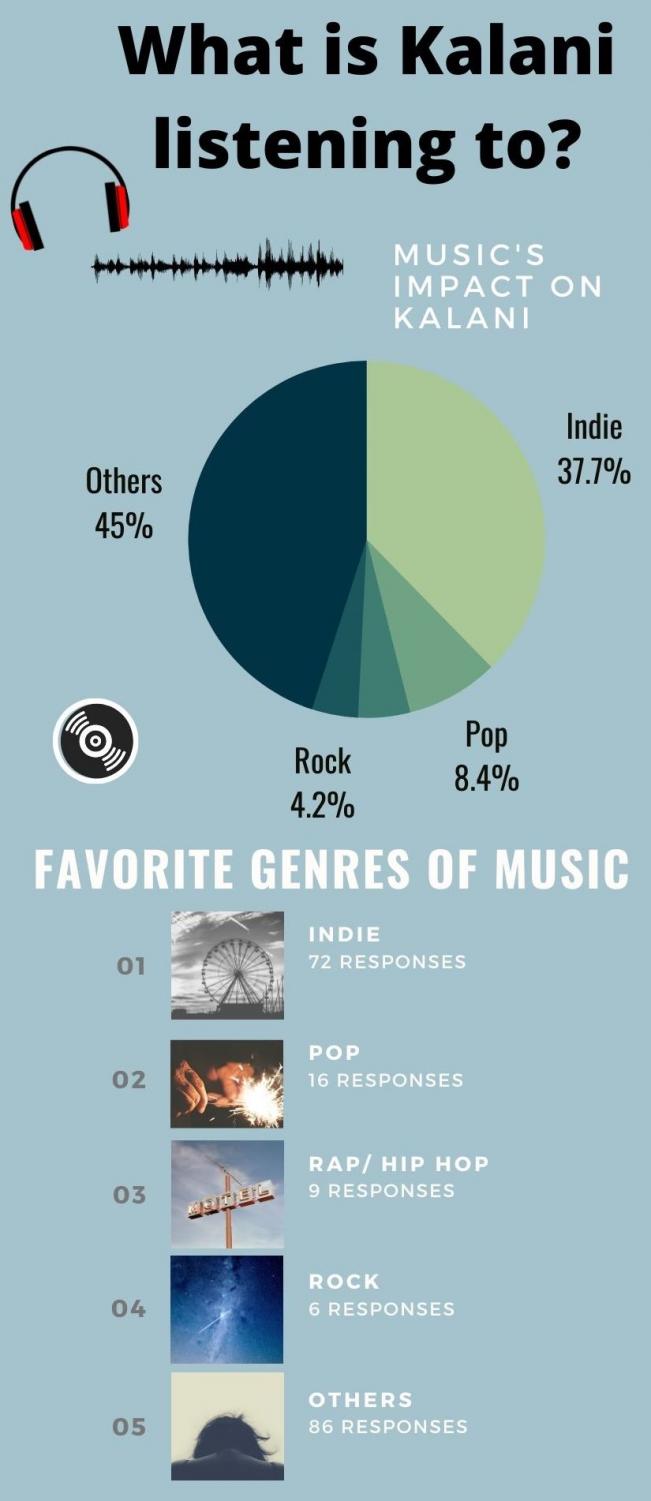Music’s Role In Students’ Lives
November 2, 2021
Beginning in infanthood, music is an integral part of a child’s social and emotional development. According to the United Nations Children’s Fund, nursery songs or singing stuffed toys stimulate the brain and encourage emotional awareness, empathy, and creativity. By adolescence, music continues to influence teens’ behavior, mood, and identity.
Music plays an essential role in student life at Kalani. According to a recent poll, more than 95% of roughly 190 Kalani students report that music impacts them. From improving concentration and mood to inspiring lifelong passions, students report that it influences their daily life.

The survey also gathered information on students’ favorite genres and artists. Its results showed that the type of music Kalani favors varies significantly, from Indie to Pop, Rap, Rock, and more.
According to the American Academy of Pediatrics (AAP), preference for certain music genres can be associated with specific behaviors. Heavy metal and rock music, for example, has been correlated with “increased depression, delinquency risk behavior, smoking, and conduct problems.”
However, no Kalani students recognized a correlation between their music preference and behavior. Students reported that music primarily served as a de-stressor.
Cooper Endo (10) describes music as a “source of inspiration” and resource that they can turn to for support on their “not-so-great” days.
“I have pretty frequent panic attacks, and I’ve found that one of the best ways to get through them is by blasting loud music and waiting for it to pass,” they explained. “Music is a great distraction for me.”
AAP supports Endo’s statement and studies show that music can serve as a distraction from problems and relieves tension and boredom. In addition, studies have reported that teens use music to “deal with loneliness and to take control of their emotional status or mood.”
Emily Velasco (10) explained that when she’s stressed, listening to music helps her calm down, so she doesn’t say or do something that she’s going to regret later.
“Listening to calming songs helps to deal with those feelings, and when I’m feeling overwhelmed, it keeps me steady,” she said.
She explained that in addition to boosting her mood, music keeps her energized and improves her ability to focus on schoolwork.
Like Velasco, more than 92% of Kalani students reported that they listen to music while studying.
In a Manipal University study, listening to music was correlated with higher levels of concentration while studying. The research also revealed that the type of music students listen to impacts their ability to concentrate. For example, participants were able to focus better when listening to soft and instrumental music compared to fast music.
For Janelle Wong (10), listening to any genre of music while studying hinders her concentration.
“I get distracted and then I start, like, totally disregarding my homework,” she said.

However, music plays a fundamental role in her life outside of school. One of Wong’s passions is musical theater, and she enjoys singing, dancing, and acting.
“It boosts my mood and I can really explore different emotions,” she explained.
Wong says that her music taste reflects her interests and is a significant part of her social life. She uses music to connect with others who have similar music tastes as her and to meet people who share her love of musical theater.
AAP describes music as important in adolescents’ socialization and identity formation, whose music preference is essential in their “integration into the youth culture.”
While this statement is true for Wong, it doesn’t apply to all students.
Isabel Hytry (11) admitted that her music taste is nothing like that of her friends. She mostly listens to early 2000s pop artists like Avril Lavigne or Taylor Swift, while her friends enjoy K-Pop. She finds music less relevant in her social life and rather pursues it as an individual passion.
Hytry wants to build a career in musical theater and has been working towards this goal since she first got into theater at three years old.
“Music has always been a part of my life,” she explained.
Like others, she added that it improves her mood and helps her escape from the stress of daily life.“Even just listening to a random song can change my whole entire day from really sucky to really good,” Hytry said.
Studies have shown that the music teens listen to often correlates with their emotions. AAP reported that about 17% of male teens and 25% of female teens liked their favorite songs because the lyrics were a reflection of their feelings.
For Hytry and other students, this isn’t their experience. Hytry explained that a good beat is what’s most important to her in a song, above anything else.
“It doesn’t really matter the emotion; it’s more about a good song that keeps a consistent beat,” she said. I’ll walk down the hallway, put on a song with a good beat, and walk to the beat of the music to get to class.”
Velara shares a similar perspective and doesn’t notice a correlation between her emotions and the music she enjoys.
“I think I just like listening to whatever I feel like,” She said. “It doesn’t matter if I’m happy or sad, I just listen to whatever feels right, even if it means listening to a sad song when I’m happy or a happy song when I’m sad.”